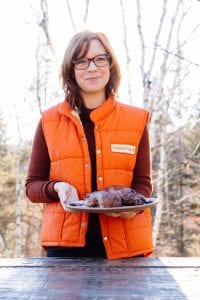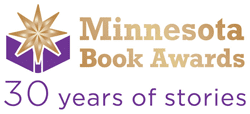Each day leading up to the 30th annual Minnesota Book Awards Ceremony, we’ll be featuring an exclusive interview with one of our 36 finalists. Learn more about these incredible local writers and gear up to see the winners announced live in person April 21.
Interview with Amy Thielen, author of Give a Girl a Knife
Category: Memoir & Creative Nonfiction, sponsored by Faegre Baker Daniels

It feels amazing! My work is pretty much suffused with my rural northern Minnesota home—its scents, topography, plants, sounds, and flavors. You could say that I wear my Minnesota pride on my sleeve. And even though the state is full of so many great writers, I think I might be the only nominee to date to come from Two Inlets Township!
My first book was a cookbook—an anthology of this region’s greatest hits—but with the memoir I tell the story of my relationship to the place itself, my hometown of Park Rapids and the surrounding communities. As I was writing this book I felt the area becoming one of its characters—sunny on the surface, but moody and contradictory beneath; complicated. My narrator regarded her hometown alternately as an old friend, a foil, and at times, something of a frenemy. As it goes with family members, our conflicts only brought us closer together.
What does writing mean to you?
I wish I could say that I write because I need to, but the truth is I didn’t begin to write in earnest until I had something urgent to say. I studied literature in college and entertained a hope of writing for a living, but quickly hit a motivational wall. I knew how to start pieces, but not how to finish them. I also felt that I hadn’t amassed enough experience to write yet, so I set out to collect them, falling back on my second love, cooking. I cooked professionally for ten years, with the full intention of cooking forever, all the while carrying around my love for writing in my back pocket.
Of course later on I realized that writing is just work; you simply have to do it, and then do it some more. Cooking gave me the kick in the pants I’d always needed. It gave me the work ethic, and it gave me the material.
It’s funny now how cooking and writing work for me. When I set out to write about food, I end up writing about something more internal and emotional; and whenever I try to write a personal essay, food images come flying out. I no longer question this phenomenon, but just chalk it up to the symbiotic—almost parasitical—relationship I have between food and words.
Why are stories important for our communities?
Writing always holds up an essential mirror to place, but I think that writing about small rural places has always been of vital importance, because these places so rarely have a representative voice in larger media. Jim Northrup said this well when he wrote, “that window to America / we see you, you don’t see us.” He was referring to the invisibility of the Native American community, but I think the sentiment is true for small rural places like my own as well. The internet is changing this of course—to a degree. But in my town I still see truth bumping up against stereotypes, almost on a daily basis. I’m always surprised by the sheer variety of people who drive into town out of the woods. For the most part, they’re individuals who resist typecasting. Iconoclasts. People who moved here to because they don’t want to be a part of a homogenous story. You can’t lump them into “country people” and call it day. Theirs are the stories I love to tell. Nothing gives me greater joy than telling stories that stomp out stereotypes.
Tell us something people might not know about you.
I’m very outgoing, but have a hermit heart. (I suspect that writers sometimes do.) Specifically, I love people and like to cultivate a sense of community, but dislike being hemmed into a single group. Despite this, I have a lifelong love for bingo—a group activity if there ever was one. And not only that, but I secretly believe that I’m good at it. Which is impossible as it’s a bald game of luck. But when I was a child my grandma told me I was lucky, a belief that was reinforced by my repeat wins at ham and turkey church bingo, and I’m holding her to it.
What do you love about libraries?
When I was a little kid I would often bike a mile from my house in town to the small public library. Back then it was a Sullivan library, with tall ceilings, dark intricate woodwork, and narrow windows that allowed mere slivers of light into the darkened space. The adult books occupied the top floor, and the children’s library was in the basement. It was in the small reading loft down there, laying on a small carpeted platform just a few feet from the ceiling, that I spent most of my time. Climbing the steep ladder to the loft was like rolling into the top berth of a train sleeping car: dark, windowless, cozy, insulated from the rest of the moving world around me. Then as now, I had big eyes when it came to checking out books, and a terrible success rate for bringing them back on time, so I mostly read them in the library. But I spent many formative afternoons laying in that tight loft, my time suspended in a book.
More about Amy Thielen
Amy Thielen is a cook and a writer. She’s the author of two books – The New Midwestern Table (which won a 2013 James Beard Foundation Book Award) and the memoir Give a Girl a Knife – and is at work on a forthcoming cookbook for W.W. Norton. She speaks and writes widely about home cooking – for radio (MPR, NPR, and the Splendid Table), TV (she was the host of Heartland Table on Food Network), and various print publications, including Saveur magazine, where she’s a contributing editor. Amy lives with her husband, visual artist Aaron Spangler, their son, his dog, and a bunch of chickens, in rural Park Rapids, Minnesota.
See the winners announced live at the 30th annual Minnesota Book Awards Ceremony!



